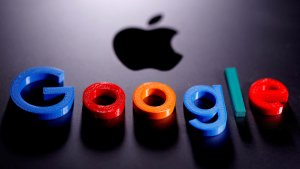The legislation compels tech companies to make it easier for consumers to pick and choose services from different providers.
EU's Digital Markets Act Hands Boost To Big Tech's Smaller Rivals
The legislation compels tech companies to make it easier for consumers to pick and choose services from different providers.

As the world's biggest tech companies revamp their core online services to comply with the European Union's landmark Digital Markets Act, the changes could give some smaller rivals and even peers a competitive edge.
The DMA is Europe's attempt to rein in Alphabet's Google, Amazon, Apple, TikTok owner ByteDance, Meta Platforms and Microsoft and create a level playing field for smaller rivals and ultimately more competition for Europeans.
The sweeping legislation compels some of the world's biggest tech companies to make it easier for consumers to pick and choose services from different providers.
"The winners will be small European businesses which will get more options and more visibility than large companies," said Christophe Carugati at advisory firm Digital Competition.
For example, Meta has to make its Facebook Messenger and WhatsApp services interoperable with eligible rivals, as long as they meet the company's technical and security standards.
In practice, this means users of other messaging apps such as Signal and Telegram – which have gained traction internationally for their emphasis on protecting user privacy – could soon be able to chat with Messenger and Whatsapp contacts without switching apps.
Meta says in its compliance report it is striking a balance between creating a viable approach for the third-party providers interested in becoming interoperable with Meta while maximizing user security, safety, and privacy.
Similarly, users of Google's Android phones will be guaranteed a choice of default search engine when setting up their device, representing a big opportunity for alternatives such as privacy-focused DuckDuckGo and environment-conscious Ecosia.
"The implementation of these new rules is a step in the right direction, but the proof of the pudding is always in the eating, and whether we see any meaningful changes in market share," Sophie Dembinski, public policy chief at Ecosia, said.
Google said in a blog this week said changes to search results mean large intermediaries and aggregators would get more traffic while hotels, airlines, merchants and restaurants would get less.
Consumers in the EU have also won new privacy protections, as the DMA introduces new rules on how these companies use their data.
For example, users can disentangle their Facebook and Instagram accounts, so information will no longer be shared across platforms for tracking and targeting purposes.
APP STORE WARS
While the DMA offers new avenues for smaller rivals to access consumers, the incumbent tech giants could also see their peers take a bite of their market shares.
Apple arguably stands to lose the most from the DMA, which forces it to open up its lucrative App Store, an opportunity that Big Tech competitors and smaller start-ups alike will likely pounce on.
Under the DMA, Apple will have to allow software developers to distribute their apps to users in the EU outside of its own App Store.
Apple has warned that changes to its iOS mobile operating system, Safari web browser, and the App Store bring greater risks to users and developers as it could include new avenues for malware, fraud and scams, illicit and harmful content, and other privacy and security threats.
Apple's critics say it is only interested in defending its profits since it receives a 30% commission on in-app purchases.
The implementation of the new rules comes amid an escalation of a row between Apple and Fortnite maker Epic Games, one of its longstanding critics.
Fortnite had planned to launch its own app store on iPhones and iPads in the EU, as per the DMA. But, on Wednesday, Apple terminated a new developer account that Epic had created in Sweden. In response, Epic accused Apple of removing one of the largest potential competitors to the Apple App Store.
The Commission has asked Apple for an explanation and sees the issue as a priority, which could become a test case for the new rules.
(Reporting by Foo Yun Chee and Martin Coulter; Editing by Matt Scuffham and Alison Williams)
Thanks for signing up to Minutehack alerts.
Brilliant editorials heading your way soon.
Okay, Thanks!

